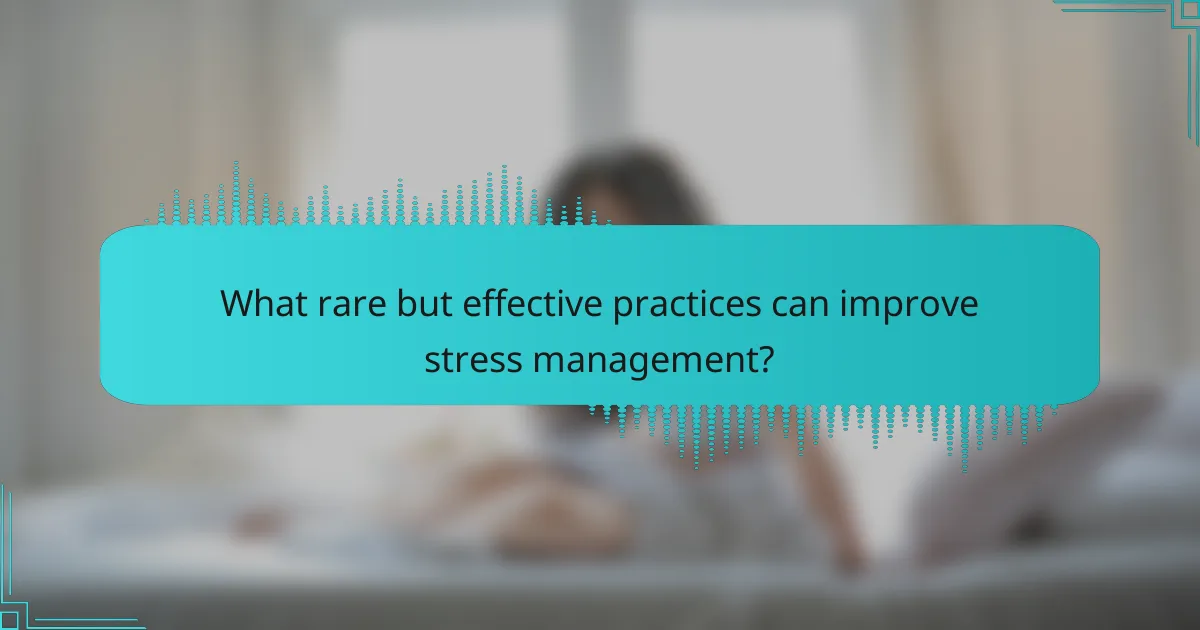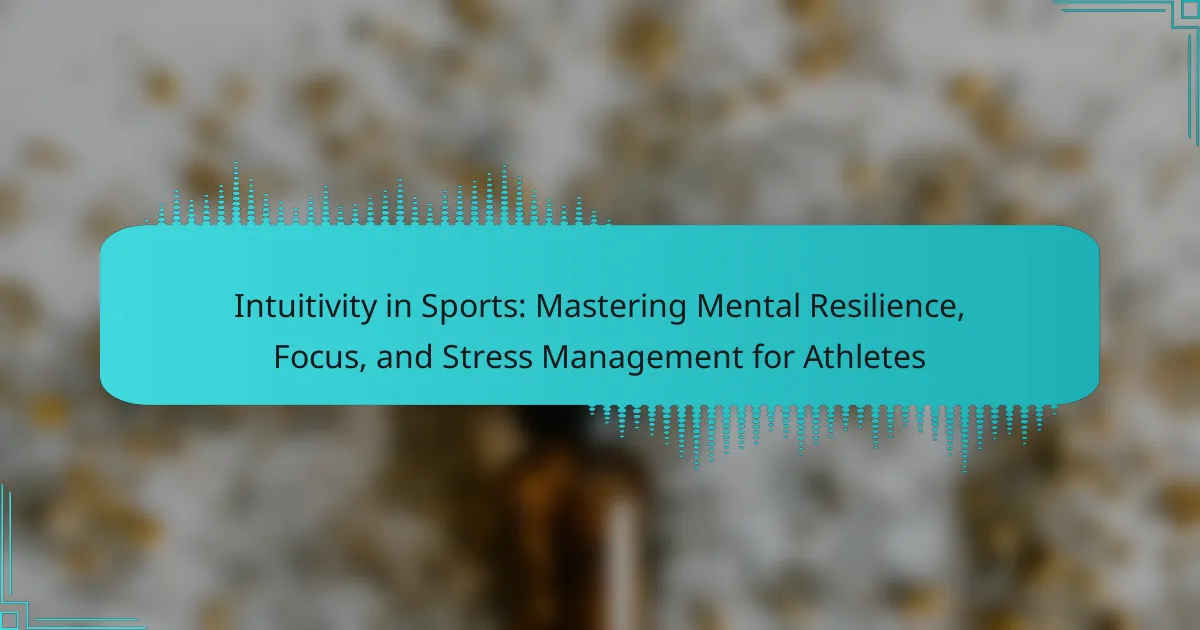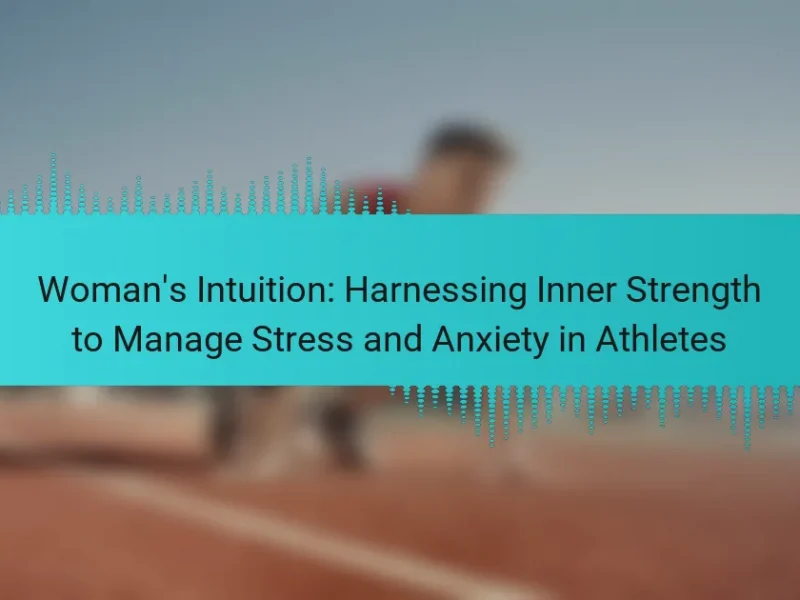Mastering mental resilience, focus, and stress management is crucial for athletes aiming to enhance performance. This article explores how mental resilience boosts motivation and recovery, effective stress management techniques like mindfulness and visualization, and methods to enhance focus through controlled breathing and meditation. Additionally, it highlights the importance of maintaining a balanced routine and seeking social support for optimal mental health.

How does mental resilience impact athletic performance?
Mental resilience significantly enhances athletic performance by enabling athletes to manage stress and maintain focus. This psychological strength allows athletes to recover quickly from setbacks and perform under pressure. Research indicates that mentally resilient athletes can sustain higher levels of motivation and commitment, which directly influences their training and competition outcomes. Furthermore, the ability to stay calm and composed during challenging situations leads to improved decision-making and execution of skills, ultimately resulting in better performance metrics.
What are the key components of mental resilience in sports?
Mental resilience in sports comprises focus, adaptability, emotional regulation, and stress management. These components enable athletes to perform under pressure and recover from setbacks.
Focus allows athletes to maintain concentration on their goals, minimizing distractions. Adaptability helps them adjust strategies during competitions, enhancing performance. Emotional regulation enables athletes to manage feelings, preventing negative emotions from impacting their game. Stress management techniques, such as mindfulness, reduce anxiety and improve overall mental clarity.
Together, these components form a robust framework for mental resilience, essential for success in competitive sports.
How can athletes develop mental resilience?
Athletes can develop mental resilience through consistent practice and targeted strategies. Techniques include visualization, mindfulness, and goal-setting, which enhance focus and reduce stress. Regularly facing challenges builds adaptability, fostering a resilient mindset. Engaging in mental training exercises, such as cognitive restructuring, can further strengthen resilience.
What role does visualization play in building resilience?
Visualization significantly enhances resilience in athletes by fostering mental clarity and emotional regulation. It allows athletes to mentally rehearse performance scenarios, which builds confidence and prepares them for challenges. Regular visualization practices can lead to improved focus and reduced anxiety, essential attributes for high-stress situations in sports. As a result, athletes develop a unique mental toolkit that supports sustained performance under pressure.
How can positive self-talk enhance mental strength?
Positive self-talk significantly enhances mental strength by fostering resilience and focus in athletes. It reinforces a positive mindset, enabling athletes to manage stress effectively. Research indicates that athletes who engage in positive self-talk experience improved performance and greater confidence during competitions. This mental strategy helps in overcoming self-doubt and enhances motivation, ultimately leading to better outcomes in sports.

What strategies can athletes use to manage stress effectively?
Athletes can manage stress effectively through techniques like mindfulness, visualization, and structured routines. Mindfulness helps in focusing on the present, reducing anxiety. Visualization allows athletes to mentally rehearse performances, enhancing confidence. Structured routines establish familiarity, providing a sense of control. Regular physical activity also releases endorphins, improving mood. Lastly, seeking support from coaches or peers fosters a collaborative environment, mitigating stress.
What are the most common sources of stress for athletes?
The most common sources of stress for athletes include performance pressure, injury concerns, and competition anxiety. Performance pressure arises from expectations set by coaches, teammates, and personal goals. Injury concerns stem from the fear of setbacks that could impact their careers. Competition anxiety is linked to the stress of competing against others and the desire to succeed. Each of these stressors can significantly affect an athlete’s mental resilience and focus.
How can breathing techniques reduce anxiety during competition?
Breathing techniques can significantly reduce anxiety during competition by promoting relaxation and focus. These techniques enhance oxygen flow, which calms the nervous system. Controlled breathing lowers heart rates, decreases muscle tension, and shifts attention from stressors to performance. Practicing methods like diaphragmatic breathing can improve mental resilience, allowing athletes to maintain concentration under pressure. As a result, athletes can perform more effectively and confidently, ultimately enhancing their competitive edge.
What is the 4-7-8 breathing technique?
The 4-7-8 breathing technique is a method that promotes relaxation and mental resilience for athletes. It involves inhaling for four seconds, holding the breath for seven seconds, and exhaling for eight seconds. This practice helps in managing stress and enhancing focus, crucial for peak performance in sports. By regulating breath, athletes can reduce anxiety and improve concentration during competitions. Consistent use of this technique can lead to better emotional control and overall mental health.
How does diaphragmatic breathing help with stress?
Diaphragmatic breathing significantly reduces stress by promoting relaxation and enhancing focus. This technique activates the parasympathetic nervous system, leading to lower heart rates and reduced anxiety levels. Athletes can utilize this method to improve mental resilience, allowing them to perform under pressure. Research indicates that consistent practice can enhance overall well-being and performance.

What unique methods can athletes employ for focus enhancement?
Athletes can enhance focus through techniques like visualization, mindfulness meditation, and controlled breathing. These unique methods foster mental resilience by training the mind to maintain concentration under pressure. Visualization involves imagining successful performance, while mindfulness meditation cultivates present-moment awareness. Controlled breathing stabilizes physiological responses, reducing stress and improving focus. Each method can be integrated into training routines for optimal performance.
How does goal setting influence athlete focus?
Goal setting significantly enhances athlete focus by providing clear objectives. When athletes establish specific, measurable goals, they create a roadmap that directs their training and competitive efforts. This clarity reduces distractions, allowing them to concentrate on performance. Furthermore, goal setting fosters intrinsic motivation, encouraging athletes to push through challenges. Research shows that athletes with defined goals exhibit higher levels of commitment and resilience, vital for maintaining focus during high-pressure situations. Ultimately, effective goal setting is a unique attribute that directly influences mental resilience and focus in sports.
What role does routine play in maintaining concentration?
Routine significantly enhances concentration by establishing predictable patterns that reduce cognitive load. Regular practice fosters familiarity, allowing athletes to focus on performance rather than decision-making. This consistency builds mental resilience, enabling athletes to manage stress effectively. Furthermore, routines can incorporate unique attributes like visualization techniques or breathing exercises, which are crucial for maintaining focus during high-pressure situations. As a result, a well-structured routine serves as a foundation for sustained concentration in sports.

What rare but effective practices can improve stress management?
Mindfulness techniques are rare yet effective practices for improving stress management in athletes. These methods enhance focus and mental resilience, allowing athletes to perform under pressure. Techniques such as visualization, deep breathing, and body scanning can significantly reduce anxiety and promote a calm mindset. Research indicates that athletes who regularly practice mindfulness report lower stress levels and improved performance metrics. Integrating these practices into training regimens can foster a unique competitive edge by enhancing mental clarity and emotional control.
How can journaling benefit an athlete’s mental health?
Journaling can significantly enhance an athlete’s mental health by promoting self-reflection and emotional expression. It helps athletes process their experiences, reduce stress, and improve focus. Regular journaling fosters mental resilience by allowing athletes to track their progress and set goals. Research indicates that expressive writing can decrease anxiety and enhance overall well-being. By documenting thoughts and feelings, athletes can better understand their emotional triggers and develop coping strategies, leading to improved performance and mental clarity.
What is the impact of nature exposure on stress levels?
Nature exposure significantly reduces stress levels for athletes by promoting mental resilience and focus. Studies show that spending time in natural environments lowers cortisol levels, enhancing overall well-being. This effect is particularly beneficial during high-pressure situations in sports, allowing athletes to maintain composure and improve performance. Engaging with nature can serve as a unique attribute in stress management strategies, promoting faster recovery and better mental clarity. By incorporating nature walks or outdoor training sessions, athletes can effectively manage stress and enhance their mental resilience.

What are the best practices for athletes to optimize mental health?
Athletes can optimize mental health by practicing mindfulness, maintaining a balanced routine, and seeking social support. Mindfulness techniques, such as meditation, enhance focus and reduce stress. A balanced routine includes regular physical activity, proper nutrition, and sufficient sleep, which collectively improve mental resilience. Social support from teammates, coaches, or mental health professionals provides crucial emotional reinforcement. Additionally, setting realistic goals fosters a sense of accomplishment and motivation. Regularly evaluating mental health through self-reflection can help athletes identify areas for improvement and adjust strategies accordingly.
What common mistakes do athletes make in managing anxiety?
Athletes often make mistakes in managing anxiety by neglecting mental preparation, misinterpreting anxiety as a weakness, and failing to implement effective coping strategies. These errors can hinder performance and mental resilience.
One common mistake is underestimating the importance of mental conditioning. Athletes may focus solely on physical training, overlooking techniques like visualization and mindfulness that enhance focus and reduce anxiety.
Additionally, many athletes misinterpret anxiety as a sign of inadequacy. This mindset can lead to increased pressure and performance anxiety, ultimately affecting their confidence and results.
Finally, a lack of personalized coping strategies can lead to ineffective management of anxiety. Athletes need to identify what works for them, whether through breathing exercises, routine adjustments, or seeking professional support.
How can seeking professional help enhance coping strategies?
Seeking professional help significantly enhances coping strategies for athletes by providing tailored support and expert guidance. Professionals offer techniques that improve mental resilience, focus, and stress management, crucial for peak performance. By identifying unique attributes of each athlete, such as personal stressors and coping styles, professionals create customized strategies. For example, cognitive-behavioral therapy can help athletes reframe negative thoughts, enhancing their ability to cope with pressure. As a result, athletes develop a robust mental toolkit, fostering long-term success in their sports careers.
What are the benefits of peer support for athletes dealing with stress?
Peer support significantly benefits athletes dealing with stress by fostering emotional resilience and enhancing performance. It provides a sense of belonging, reducing feelings of isolation. Shared experiences create understanding, allowing athletes to express concerns openly. This support system can improve coping strategies, leading to better stress management. Furthermore, peer interactions can boost motivation, encouraging athletes to maintain focus and commitment to their goals.


